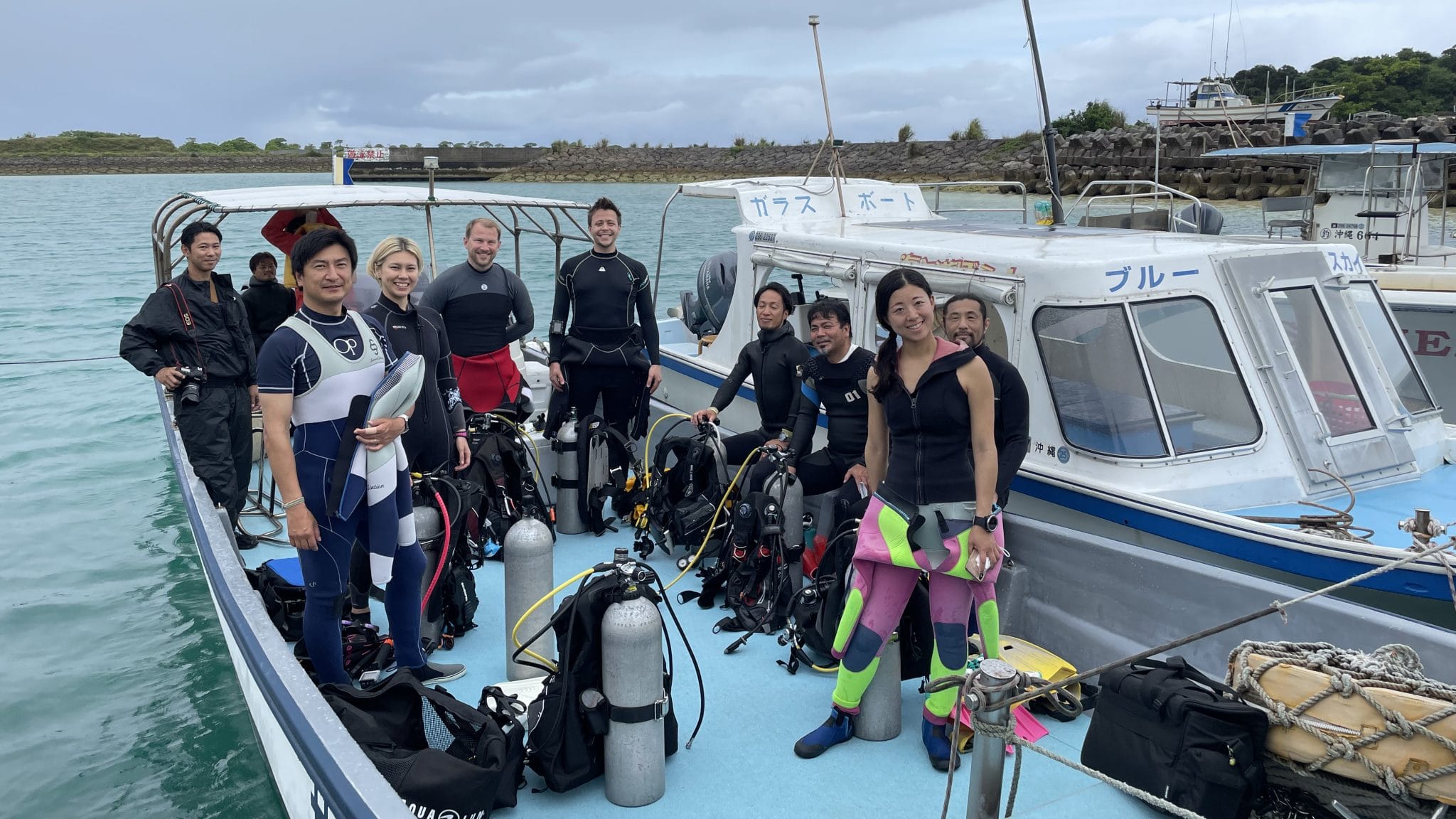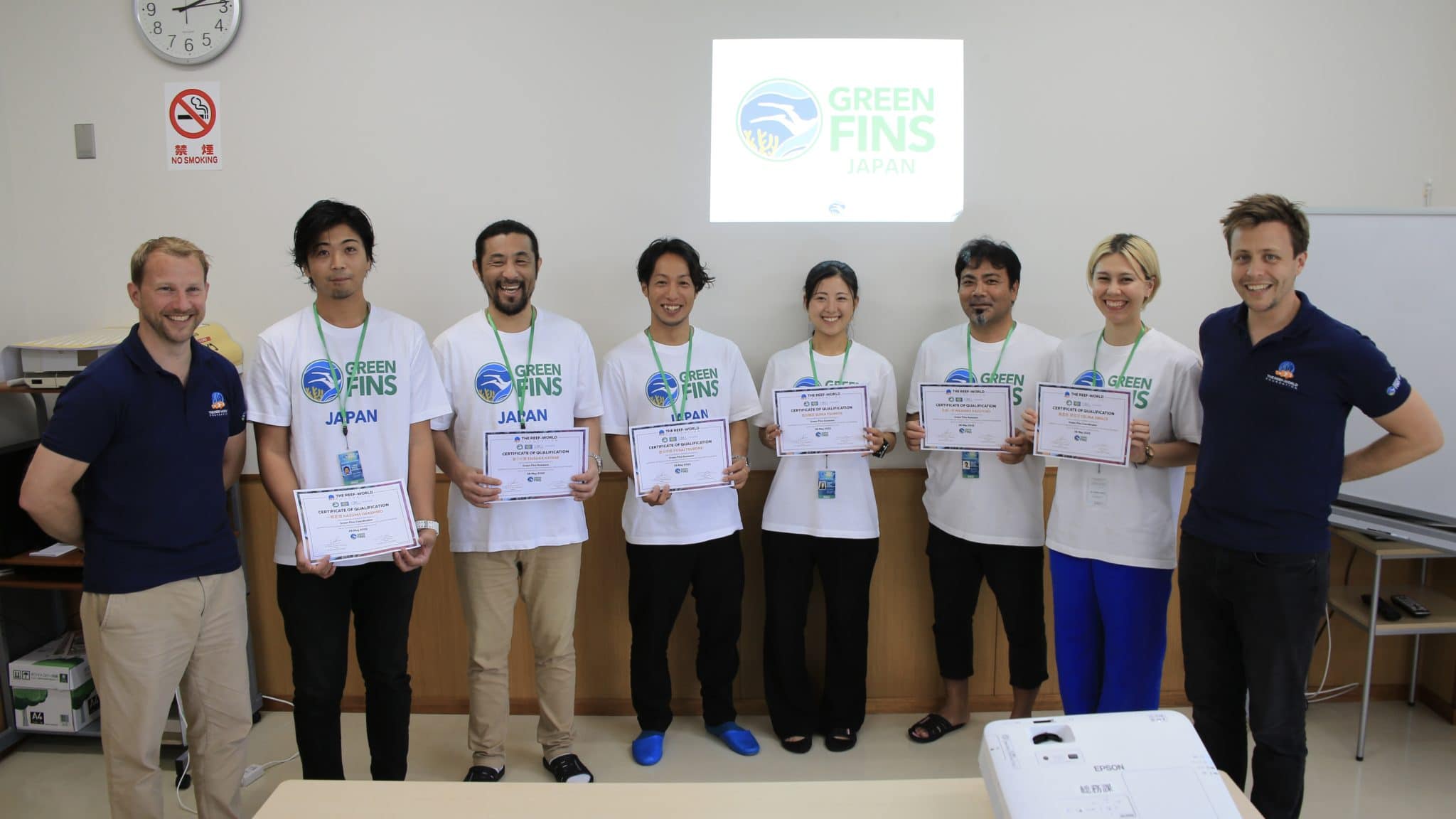Marine Life & Conservation
Reef-World launches Green Fins Japan!

 The Reef-World Foundation, the Onna Village Diving Association, the local government, and Oceana are delighted to announce that Japan is now the 14th country globally to implement the Green Fins initiative – a UN Environment Programme initiative. Onna Village in Okinawa is the first Japanese tourist destination to adopt Green Fins environmental standards to reduce the threats associated with diving and snorkelling on the marine environment.
The Reef-World Foundation, the Onna Village Diving Association, the local government, and Oceana are delighted to announce that Japan is now the 14th country globally to implement the Green Fins initiative – a UN Environment Programme initiative. Onna Village in Okinawa is the first Japanese tourist destination to adopt Green Fins environmental standards to reduce the threats associated with diving and snorkelling on the marine environment.
Green Fins is piloted in Onna Village, Okinawa prefecture, an area renowned for its marine sports and has been working to protect its reefs for many years. Green Fins is implemented as part of the national Sustainable Development Goals project, which aims to manage and illustrate to the local industry how sustainable tourism can play a role in reef conservation. The economic benefits of the reefs benefit not only the fisheries industry but also the tourism industry as it has rocketed in recent decades.
If the project is successful – proving the value of sustainable tourism – the model has the potential to be escalated to a national level. A wide rollout would allow Reef-World to focus on uptake and expansion into other marine tourism and biodiversity hotspots across Japan. Green Fins implementation in Japan would provide practical solutions to many of the common problems faced in the area. It would also help to promote high standards for diving in the country. Improving the quality of the diving industry through Green Fins would demonstrate the added value of Onna Village’s tourism product. This, in turn, will encourage tourists to spend more time and money diving in the region.
Following a week of training by Reef-World (23 to 28 May 2022), Japan now has a national Green Fins team comprised of four fully certified Green Fins Assessors and two Green Fins Coordinators from Oceana and the local government. They will be responsible for recruiting, assessing, training and certifying dive and snorkel operators to become Green Fins members in the country. This involves providing training about the ecology and threats to coral reefs, simple and local everyday solutions to these threats and Green Fins’ environmental standards to dive and snorkel operators. Green Fins membership will help marine tourism operators improve their sustainability and prove they are working hard to follow environmental best practices as a way of attracting eco-minded tourists.
James Harvey, Director at The Reef-World Foundation, said: “We are really excited to finally introduce Green Fins in Japan. We have been planning this for almost three years, but the travel restrictions related to the pandemic hindered progress. The diving industry in Okinawa and the marine life upon which it has been built is so unique, it must be preserved for generations to come. The Okinawa diving community is very passionate about protecting their marine environment, and Green Fins has given them an opportunity to collectively work to reduce their environmental impact and pursue exemplary environmental standards.”
Diving and snorkelling related damage to sensitive marine ecosystems, including coral reefs, is becoming an increasingly significant issue. This damage makes them less likely to survive other local and wider stressors, such as overfishing or plastic debris and the effects of climate change. Based on robust individual assessments, the Green Fins initiative helps identify and mitigate these risks by providing environmental consultation and support to dive and snorkel operators. Through Green Fins implementation in Japan, Reef-World aims to reduce negative environmental impacts in the region by reaching 10 marine tourism operators, training 50 dive guides and raising awareness of sustainability best practices among 10,000 tourists in the first year.
Yuta Kawamoto, CEO of Oceana, said: “Green Fins will help to unify all the conservation efforts in Okinawa by applying the guidelines in many areas and raising tourists awareness. We hope this will increase the sustainable value in the diving industry and in turn increase the diving standards in the country.”
Green Fins is a UN Environment Programme initiative, internationally coordinated by The Reef-World Foundation, which aims to protect and conserve coral reefs through environmentally friendly guidelines to promote a sustainable diving and snorkelling tourism industry. Green Fins provides the only internationally recognised environmental standards for the diving and snorkelling industry and has a robust assessment system to measure compliance.
To date, four dive operators in Onna Village have joined the global network of 600+ trained and assessed Green Fins members. These are: Benthos Divers, Okinawa Diving Center, Arch Angel and Pink Marlin Club. There has also been significant interest from other operators, even those that are not located in Onna Village, for Green Fins training and assessment.
Suika Tsumita from Oceana said: “Green Fins serve as an important tool for local diving communities to move towards a more sustainable use of their dive sites; so that they can maintain their scenic beauty and biological richness to provide livelihoods for many generations to come.”
For more information, please visit www.reef-world.org or www.greenfins.net/countries/
Dive and snorkel operators in Japan interested in signing up to be Green Fins members can contact the Green Fins Japan team at japan@greenfins.net.
Blogs
Invitation from The Ocean Cleanup for San Francisco port call

6 years ago, The Ocean Cleanup set sail for the Great Pacific Garbage Patch with one goal: to develop the technology to be able to relegate the patch to the history books. On 6 September 2024, The Ocean Cleanup fleet returns to San Francisco bringing with it System 03 to announce the next phase of the cleanup of the Great Pacific Garbage Patch and to offer you a chance to view our cleanup system up-close and personal.
We look forward to seeing you there.
To confirm your presence, please RSVP to press@theoceancleanup.com
PROGRAM
Join The Ocean Cleanup as our two iconic ships and the extraction System 03 return to San Francisco, 6 years and over 100 extractions after we set sail, to create and validate the technology needed to rid the oceans of plastic.
Our founder and CEO, Boyan Slat, will announce the next steps for the cleanup of the Great Pacific Garbage Patch. Giving you a chance to view our cleanup system and the plastic extracted.
Hear important news on what’s next in the mission of The Ocean Cleanup as it seeks to make its mission of ridding the world’s oceans of plastic an achievable and realistic goal.
Interviews and vessel tours are available on request.
PRACTICALITIES
Date: September 6, 2024
Press conference: 12 pm (noon)
Location: The Exploratorium (Google Maps)
Pier 15 (Embarcadero at Green Street), San Francisco, CA
Parking: Visit The Exploratorium’s website for details.
RSVP: press@theoceancleanup.com
Video & photo material from several viewing spots around the bay
We look forward to seeing you there!
ABOUT THE OCEAN CLEANUP
The Ocean Cleanup is an international non-profit that develops and scales technologies to rid the world’s oceans of plastic. They aim to achieve this goal through a dual strategy: intercepting in rivers to stop the flow and cleaning up what has already accumulated in the ocean. For the latter, The Ocean Cleanup develops and deploys large-scale systems to efficiently concentrate the plastic for periodic removal. This plastic is tracked and traced to certify claims of origin when recycling it into new products. To curb the tide via rivers, The Ocean Cleanup has developed Interceptor™ Solutions to halt and extract riverine plastic before it reaches the ocean. As of June 2024, the non-profit has collected over 12 million kilograms (26.4 million pounds) of plastic from aquatic ecosystems around the world. Founded in 2013 by Boyan Slat, The Ocean Cleanup now employs a broadly multi-disciplined team of approximately 140. The foundation is headquartered in Rotterdam, the Netherlands, and opened its first regional office in Kuala Lumpur, Malaysia, in 2023.
Find out more about The Ocean Cleanup at www.theoceancleanup.com.
Marine Life & Conservation
SHARK MONTH ARRIVES AT ROYAL WILLIAM YARD, PLYMOUTH

A shark has been spotted approaching Royal William Yard in Plymouth, much to the surprise of swimmers, paddleboarders and onlookers.
With its distinctive dorsal fin cutting through the water, the sizeable shark swam along the coastline, before turning to head inland towards Firestone Arch at Royal William Yard. The appearance drew a crowd, who were captivated for more than an hour by the unusual sight – and it was all caught on video.
The shark is one of many expected sightings at Royal William Yard over the coming weeks… because today marks the start of Shark Month!
In reality, the ‘shark’ spotted along the Plymouth shoreline was actually a custom-made model, created by the team at Royal William Yard and sailed underwater by Caroline Robertson‑Brown from the Shark Trust, who donned scuba diving gear for the occasion.
The stunt took place to launch Shark Month in style and draw attention to the work of the leading international conservation charity, which is based in Britain’s Ocean City. Spectators were reassured that the water was safe and many entered into the spirit of the performance, swimming or sailing alongside the shark.
Shark Month will take place across Royal William Yard throughout July and will feature an extravaganza of art, entertainment and advocacy for everyone to enjoy. The packed programme of events starts with an art exhibition and ends with a trip on paddleboards with shark experts – with everything from a shark quiz to a Jaws screening in between.
Paul Cox, CEO of the Shark Trust, said: “There are often assumptions and misconceptions when it comes to sharks. This was certainly the case with the shark spotted at Royal William Yard! While the British coastline is home to many species of shark, this was not one of them. However, we’re thrilled it caught people’s attention, because seeing a shark is a special and memorable moment. That is precisely why we want to celebrate these incredible creatures, highlight the need for conservation, and ask for help to safeguard their future.”
For more information about Shark Month at Royal William Yard, visit the Shark Trust Website.
Images and video: Jay Stone
-

 Blogs2 months ago
Blogs2 months agoDiving With… Nico, Ocean Earth Travels, Indonesia
-

 News1 month ago
News1 month agoMurex Bangka Announce New Oceanfront Cottages & Beachfront Dining
-

 Blogs2 months ago
Blogs2 months agoA new idea in freediving from RAID
-

 Marine Life & Conservation1 month ago
Marine Life & Conservation1 month agoIceland issue millionaire whale hunter a licence to murder 128 vulnerable fin whales
-

 Marine Life & Conservation2 months ago
Marine Life & Conservation2 months agoThe Shark Trust Great Shark Snapshot is back
-

 News3 months ago
News3 months agoCharting New Waters; NovoScuba Goes Global with the Launch of their Revolutionary Dive Training Agency!
-

 Gear News1 month ago
Gear News1 month agoNew Suunto Ocean – a dive computer and GPS sports watch in one for adventures below and above the surface
-

 Marine Life & Conservation Blogs2 months ago
Marine Life & Conservation Blogs2 months agoBook Review: Plankton

















